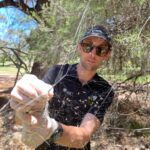Curtin University researchers have found evidence that targeting specific cells in the body can reverse the effects of cancer on the immune system.
Dr Connie Jackaman, Early Career Development Fellow at the Curtin Health Innovation Research Institute (CHIRI), is leading a study focussed on the capacity of the immune system in older people to deal with cancers.
The research tracked particular cells within the immune system of young and geriatric mice, finding that deterioration, caused by mimicked conditions of lung cancers, could be reduced by activating other cell types.
Dr Jackaman said that the immune system in elderly people, even those who were healthy, was skewed towards immune suppression but this could be mediated by targeting ‘macrophages’, a cell found in the immune system.
“The most important outcome from this study was that activating these macrophages restored both age-related and tumour-induced immune dysfunction,” Dr Jackaman said.
“That is, we could make elderly cells young again by targeting them in the right way, the outcome of which could have real implications for cancer immunotherapy in the elderly.”
Although this is the first research undertaken on this topic, the team are confident these findings will have a positive impact on cancer and mesothelioma treatment.
The research is a joint project between the Curtin School of Biomedical Sciences and the School of Anatomy at University of Western Australia.
It was undertaken within the new CHIRI Biosciences Research facility hosted at Curtin’s Bentley Campus and supported by the Cancer Council WA Suzanne Cavanagh Early Career Investigator Scheme.
Read the full research article published in the top journal in the field of gerontology and geriatrics, Aging Cell.


